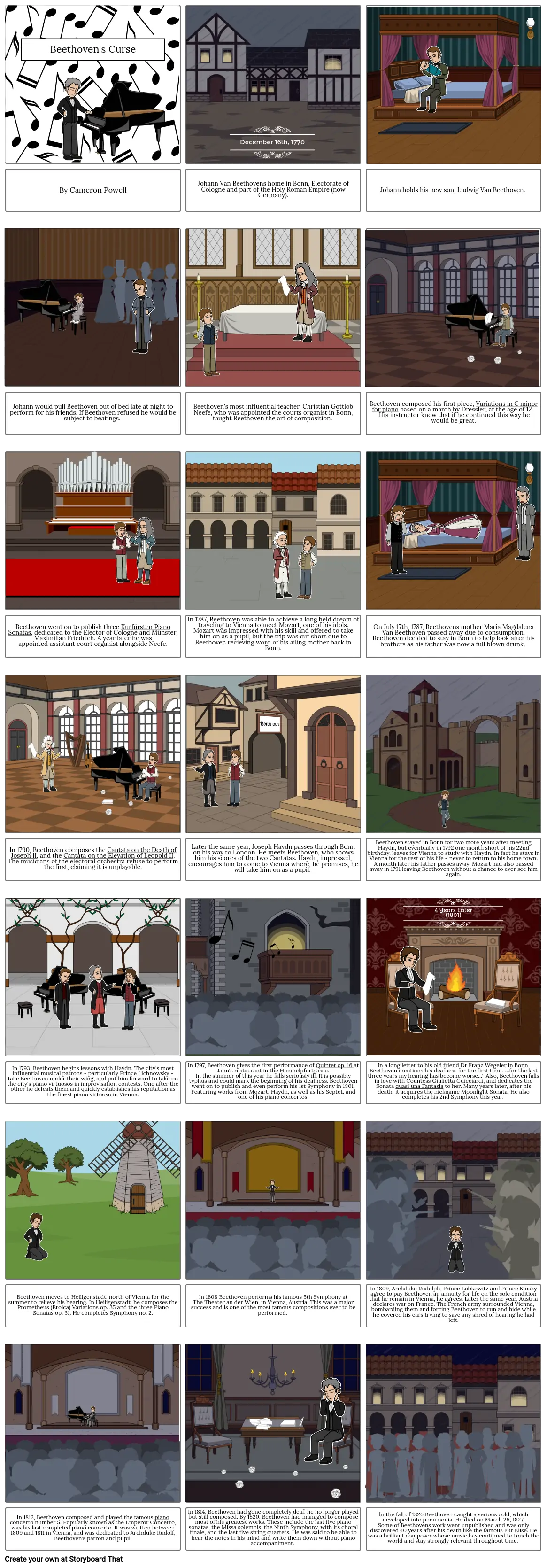Beethoven's Gift

Süžeeskeem Tekst
- Beethoven's Curse
- December 16th, 1770
- By Cameron Powell
- Johann Van Beethovens home in Bonn, Electorate of Cologne and part of the Holy Roman Empire (now Germany).
- Johann holds his new son, Ludwig Van Beethoven.
- Johann would pull Beethoven out of bed late at night to perform for his friends. If Beethoven refused he would be subject to beatings.
- Beethoven's most influential teacher, Christian Gottlob Neefe, who was appointed the courts organist in Bonn, taught Beethoven the art of composition.
- Beethoven composed his first piece, Variations in C minor for piano based on a march by Dressler, at the age of 12. His instructor knew that if he continued this way he would be great.
- Beethoven went on to publish three Kurfürsten Piano Sonatas, dedicated to the Elector of Cologne and Münster, Maximilian Friedrich. A year later he was appointed assistant court organist alongside Neefe.
- In 1787, Beethoven was able to achieve a long held dream of traveling to Vienna to meet Mozart, one of his idols. Mozart was impressed with his skill and offered to take him on as a pupil, but the trip was cut short due to Beethoven recieving word of his ailing mother back in Bonn.
- On July 17th, 1787, Beethovens mother Maria Magdalena Van Beethoven passed away due to consumption. Beethoven decided to stay in Bonn to help look after his brothers as his father was now a full blown drunk.
- Bonn inn
- In 1790, Beethoven composes the Cantata on the Death of Joseph II, and the Cantata on the Elevation of Leopold II. The musicians of the electoral orchestra refuse to perform the first, claiming it is unplayable.
- Later the same year, Joseph Haydn passes through Bonn on his way to London. He meets Beethoven, who shows him his scores of the two Cantatas. Haydn, impressed, encourages him to come to Vienna where, he promises, he will take him on as a pupil.
- Beethoven stayed in Bonn for two more years after meeting Haydn, but eventually in 1792 one month short of his 22nd birthday, leaves for Vienna to study with Haydn. In fact he stays in Vienna for the rest of his life - never to return to his home town. A month later his father passes away. Mozart had also passed away in 1791 leaving Beethoven without a chance to ever see him again.
- 4 Years Later (1801)
- In 1793, Beethoven begins lessons with Haydn. The city's most influential musical patrons - particularly Prince Lichnowsky - take Beethoven under their wing, and put him forward to take on the city's piano virtuosos in improvisation contests. One after the other he defeats them and quickly establishes his reputation as the finest piano virtuoso in Vienna.
- In 1797, Beethoven gives the first performance of Quintet op. 16 at Jahn's restaurant in the Himmelpfortgasse. In the summer of this year he falls seriously ill. It is possibly typhus and could mark the beginning of his deafness. Beethoven went on to publish and even perform his 1st Symphony in 1801. Featuring works from Mozart, Haydn, as well as his Septet, and one of his piano concertos.
- In a long letter to his old friend Dr Franz Wegeler in Bonn, Beethoven mentions his deafness for the first time. '...for the last three years my hearing has become worse...' Also, Beethoven falls in love with Countess Giulietta Guicciardi, and dedicates the Sonata quasi una Fantasia to her. Many years later, after his death, it acquires the nickname Moonlight Sonata. He also completes his 2nd Symphony this year.
- Beethoven moves to Heiligenstadt, north of Vienna for the summer to relieve his hearing. In Heiligenstadt, he composes the Prometheus (Eroica) Variations op. 35 and the three Piano Sonatas op. 31. He completes Symphony no. 2.
- In 1808 Beethoven performs his famous 5th Symphony at The Theater an der Wien, in Vienna, Austria. This was a major success and is one of the most famous compositions ever to be performed.
- In 1809, Archduke Rudolph, Prince Lobkowitz and Prince Kinsky agree to pay Beethoven an annuity for life on the sole condition that he remain in Vienna, he agrees. Later the same year, Austria declares war on France. The French army surrounded Vienna, bombarding them and forcing Beethoven to run and hide while he covered his ears trying to save any shred of hearing he had left.
- In 1812, Beethoven composed and played the famous piano concerto number 5. Popularly known as the Emperor Concerto, was his last completed piano concerto. It was written between 1809 and 1811 in Vienna, and was dedicated to Archduke Rudolf, Beethoven's patron and pupil.
- In 1814, Beethoven had gone completely deaf, he no longer played but still composed. By 1820, Beethoven had managed to compose most of his greatest works. These include the last five piano sonatas, the Missa solemnis, the Ninth Symphony, with its choral finale, and the last five string quartets. He was said to be able to hear the notes in his mind and write them down without piano accompaniment.
- In the fall of 1826 Beethoven caught a serious cold, which developed into pneumonia. He died on March 26, 1827. Some of Beethovens work went unpublished and was only discovered 40 years after his death like the famous Für Elise. He was a brilliant composer whose music has continued to touch the world and stay strongly relevant throughout time.
Loodud üle 30 miljoni süžeeskeemi
Proovimiseks Pole Vaja Allalaadimist, Krediitkaarti ega Sisselogimist!
